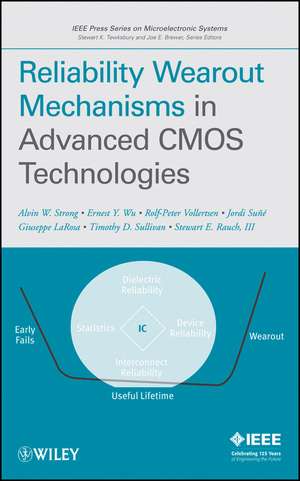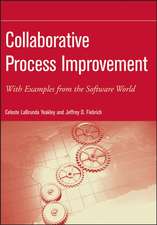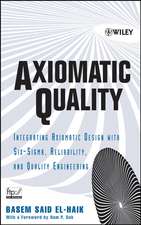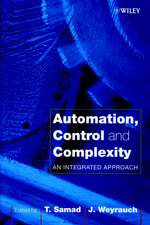Reliability Wearout Mechanisms in Advanced CMOS Technologies: IEEE Press Series on Microelectronic Systems
Autor AW Strongen Limba Engleză Hardback – 3 sep 2009
Din seria IEEE Press Series on Microelectronic Systems
- 24%
 Preț: 795.39 lei
Preț: 795.39 lei - 24%
 Preț: 731.05 lei
Preț: 731.05 lei - 9%
 Preț: 1494.07 lei
Preț: 1494.07 lei - 9%
 Preț: 940.49 lei
Preț: 940.49 lei - 9%
 Preț: 855.39 lei
Preț: 855.39 lei - 9%
 Preț: 833.69 lei
Preț: 833.69 lei - 9%
 Preț: 743.60 lei
Preț: 743.60 lei - 8%
 Preț: 444.21 lei
Preț: 444.21 lei - 9%
 Preț: 821.30 lei
Preț: 821.30 lei - 9%
 Preț: 822.95 lei
Preț: 822.95 lei - 8%
 Preț: 642.00 lei
Preț: 642.00 lei - 31%
 Preț: 1121.39 lei
Preț: 1121.39 lei - 31%
 Preț: 1002.89 lei
Preț: 1002.89 lei - 32%
 Preț: 756.21 lei
Preț: 756.21 lei - 30%
 Preț: 967.14 lei
Preț: 967.14 lei
Preț: 1181.16 lei
Preț vechi: 1297.98 lei
-9% Nou
Puncte Express: 1772
Preț estimativ în valută:
226.01€ • 236.61$ • 187.01£
226.01€ • 236.61$ • 187.01£
Carte tipărită la comandă
Livrare economică 05-19 aprilie
Preluare comenzi: 021 569.72.76
Specificații
ISBN-13: 9780471731726
ISBN-10: 0471731722
Pagini: 640
Dimensiuni: 156 x 234 x 35 mm
Greutate: 0.98 kg
Editura: Wiley
Seria IEEE Press Series on Microelectronic Systems
Locul publicării:Hoboken, United States
ISBN-10: 0471731722
Pagini: 640
Dimensiuni: 156 x 234 x 35 mm
Greutate: 0.98 kg
Editura: Wiley
Seria IEEE Press Series on Microelectronic Systems
Locul publicării:Hoboken, United States
Public țintă
Advanced undergraduate and graduate students, professionals and design engineersNotă biografică
Cuprins
Descriere
This invaluable resource tells the complete story of failure mechanisms from basic concepts to the tools necessary to conduct reliability tests and analyze the results. Both a text and a reference work for this important area of semiconductor technology, it assumes no reliability education or experience.























